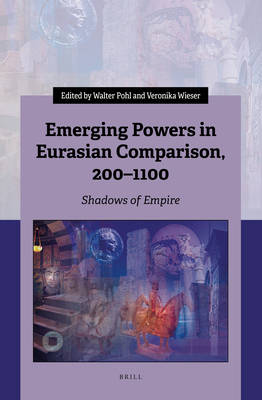
- Afhalen na 1 uur in een winkel met voorraad
- Gratis thuislevering in België vanaf € 30
- Ruim aanbod met 7 miljoen producten
- Afhalen na 1 uur in een winkel met voorraad
- Gratis thuislevering in België vanaf € 30
- Ruim aanbod met 7 miljoen producten
Zoeken
€ 163,24
+ 326 punten
Omschrijving
This book compares the ways in which new powers arose in the shadows of the Roman Empire and its Byzantine and Carolingian successors, of Iran, the Caliphate and China in the first millennium CE. These new powers were often established by external military elites who had served the empire. They remained in an uneasy balance with the remaining empire, could eventually replace it, or be drawn into the imperial sphere again. Some relied on dynastic legitimacy, others on ethnic identification, while most of them sought imperial legitimation. Across Eurasia, their dynamic was similar in many respects; why were the outcomes so different?
Contributors are Alexander Beihammer, Maaike van Berkel, Francesco Borri, Andrew Chittick, Michael R. Drompp, Stefan Esders, Ildar Garipzanov, Jürgen Paul, Walter Pohl, Johannes Preiser-Kapeller, Helmut Reimitz, Jonathan Shepard, Q. Edward Wang, Veronika Wieser, and Ian N. Wood.
Contributors are Alexander Beihammer, Maaike van Berkel, Francesco Borri, Andrew Chittick, Michael R. Drompp, Stefan Esders, Ildar Garipzanov, Jürgen Paul, Walter Pohl, Johannes Preiser-Kapeller, Helmut Reimitz, Jonathan Shepard, Q. Edward Wang, Veronika Wieser, and Ian N. Wood.
Specificaties
Betrokkenen
- Auteur(s):
- Uitgeverij:
Inhoud
- Aantal bladzijden:
- 468
- Taal:
- Engels
Eigenschappen
- Productcode (EAN):
- 9789004518568
- Verschijningsdatum:
- 11/01/2023
- Uitvoering:
- Hardcover
- Formaat:
- Genaaid
- Afmetingen:
- 160 mm x 239 mm
- Gewicht:
- 576 g

Alleen bij Standaard Boekhandel
+ 326 punten op je klantenkaart van Standaard Boekhandel
Beoordelingen
We publiceren alleen reviews die voldoen aan de voorwaarden voor reviews. Bekijk onze voorwaarden voor reviews.











